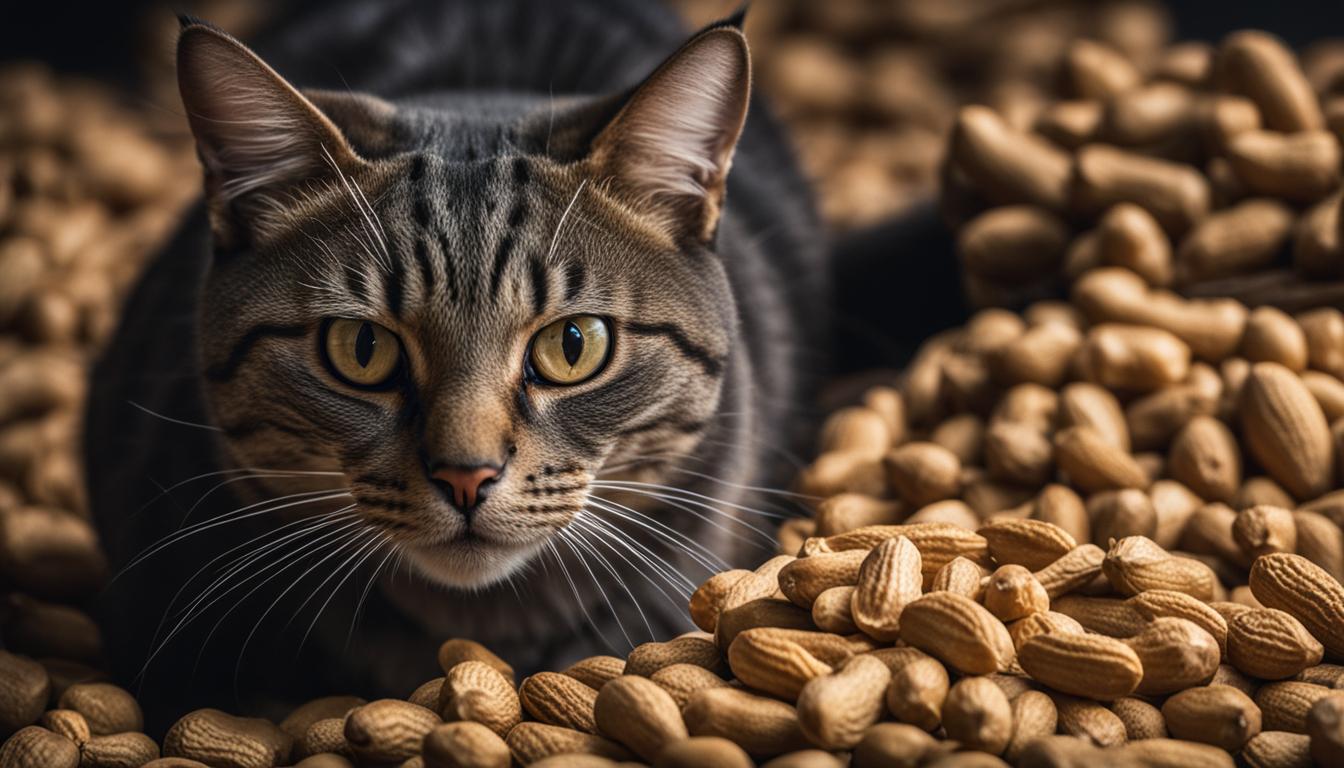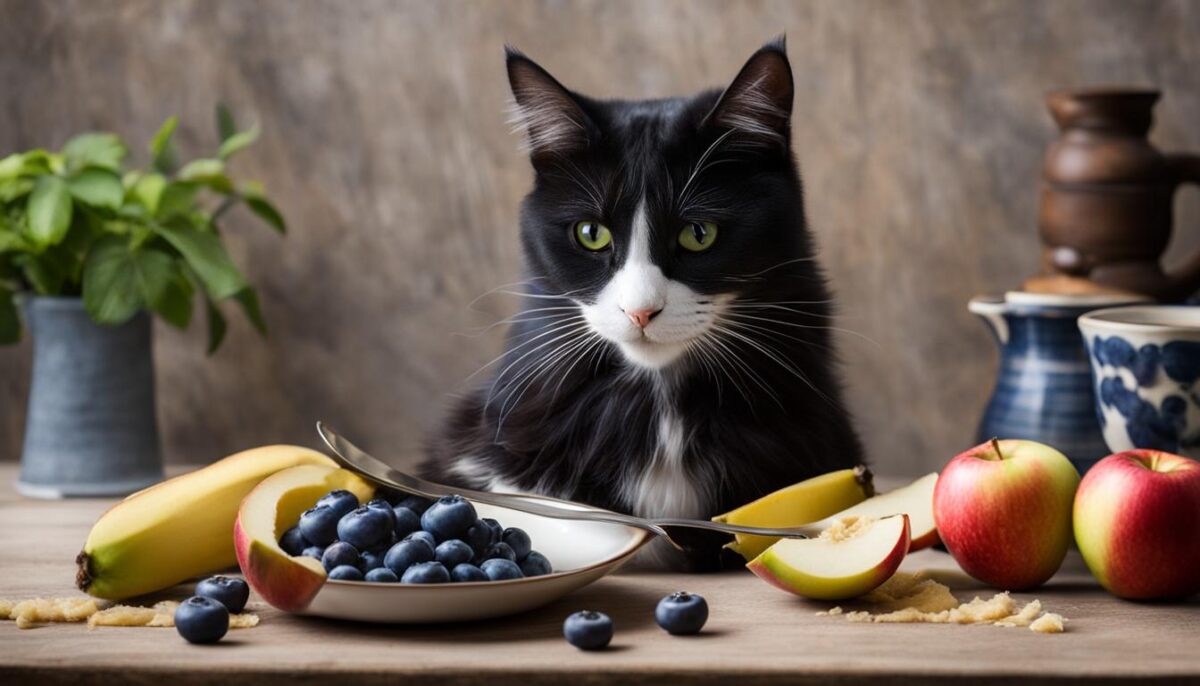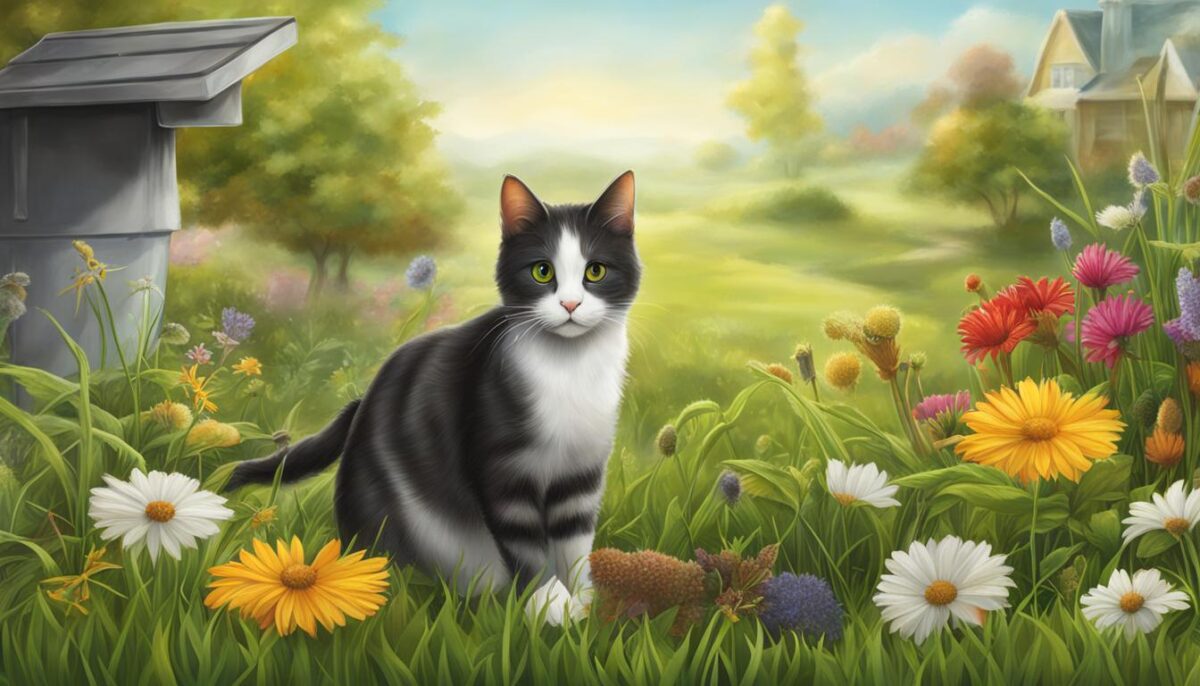Many cat owners wonder if it is safe to share peanuts with their feline friends. Let’s explore the topic and find out if cats can safely consume peanuts.
Key Takeaways:
- Cats can develop allergies to peanuts, just like humans.
- Peanuts can pose choking hazards and lead to gastrointestinal upset in cats.
- It is generally best to avoid feeding peanuts to cats and opt for species-appropriate treats instead.
- Always monitor your cat for signs of allergic reactions if you suspect they have consumed peanuts.
- Consult with your veterinarian for any dietary concerns or questions regarding your cat’s diet.
The Risks of Giving Cats Peanuts
Feeding cats peanuts may seem harmless, but it can actually pose several risks to their health. First and foremost, peanuts can be a choking hazard for cats, especially if they are not properly ground or crushed. Their small size and hard texture make them difficult for cats to chew and swallow safely. To avoid this risk, it is best to refrain from feeding cats whole peanuts.
Another concern when it comes to cats consuming peanuts is the high-fat content. Peanuts are known for their richness in fats, and this can lead to gastrointestinal upset in cats. Feeding cats peanuts regularly or in large quantities can cause digestive issues such as diarrhea and vomiting. It is important to prioritize a balanced diet that meets their nutritional needs without relying on peanuts as a snack.
“Feeding cats peanuts can be risky due to the potential for choking and digestive upset. It’s best to stick to a balanced, species-appropriate diet.”
Lastly, it is important to note that some cats may have allergic reactions to peanuts. Just like humans, cats can develop allergies to certain foods, including peanuts. Signs of an allergic reaction in cats may include itching, swelling, and difficulty breathing. If you suspect that your cat has consumed peanuts and is exhibiting these symptoms, it is crucial to seek veterinary care immediately.
| Risks of Giving Cats Peanuts | Precautions |
|---|---|
| Choking hazard | Avoid feeding whole peanuts |
| Gastrointestinal upset | Refrain from feeding large quantities of peanuts |
| Allergic reactions | Monitor for symptoms and seek veterinary care if necessary |
Peanut Allergies in Cats
Just like humans, cats can develop allergies to certain foods, including peanuts. Peanut allergies in cats can cause a range of symptoms, including itching, hives, swelling, diarrhea, and vomiting. In severe cases, an allergic reaction can lead to anaphylaxis, a life-threatening condition. It is important to monitor your cat closely for any signs of an allergic reaction if you suspect they have consumed peanuts.
Signs of Peanut Allergy in Cats
If you suspect that your cat has a peanut allergy, it is crucial to look out for certain signs and symptoms. Cats with peanut allergies may exhibit the following:
- Excessive itching or scratching
- Hives or swollen skin
- Diarrhea or vomiting
- Difficulty breathing
If you notice any of these symptoms after your cat has ingested peanuts or any peanut-containing products, it is recommended to consult with your veterinarian for appropriate guidance.
Treatment and Management
Unfortunately, there is no cure for peanut allergies in cats. The best approach is to prevent exposure to peanuts and closely monitor your cat’s diet. If your cat accidentally consumes peanuts or shows signs of an allergic reaction, seek immediate veterinary care. Your veterinarian may recommend antihistamines or other medications to alleviate symptoms and prevent further complications.
Remember, the health and well-being of your cat should always be the top priority. If you have any concerns about your cat’s dietary needs or potential allergies, consult with your veterinarian for personalized advice and recommendations.
| Common Signs of Peanut Allergy in Cats | |
|---|---|
| Excessive itching or scratching | Hives or swollen skin |
| Diarrhea or vomiting | Difficulty breathing |
Can Cats Safely Consume Peanuts?
When it comes to peanuts, it’s important to think twice before sharing them with your feline companion. While some cats may be able to tolerate small amounts of peanuts without any adverse effects, it is generally recommended to avoid feeding peanuts to cats. Why? Well, cats have different dietary needs and digestive systems compared to humans, and peanuts may not provide any nutritional benefit for them.
Feeding cats peanuts can pose various risks. First and foremost, peanuts can be a choking hazard, especially if they are not properly ground or crushed. Additionally, peanuts are high in fat, and their consumption can lead to gastrointestinal upset, including diarrhea and vomiting. Moreover, cats, just like humans, can develop allergies to certain foods, including peanuts. An allergic reaction to peanuts in cats can cause itching, hives, swelling, diarrhea, and vomiting. In severe cases, it can even lead to anaphylaxis, which is a life-threatening condition.
As responsible pet owners, it’s crucial to prioritize your cat’s health and well-being. Instead of offering peanuts as a treat, opt for commercially available cat treats that are specifically formulated to meet feline dietary needs. You can also provide small pieces of cooked chicken or fish as occasional treats. Always consult with your veterinarian for recommendations on safe and healthy snacks for your furry friend.
| Reasons to Avoid Feeding Peanuts to Cats | Precautions for Feeding Cats Peanuts |
|---|---|
| ✘ Choking Hazard | ⚠ Ensure peanuts are properly ground or crushed before offering them to your cat. |
| ✘ Gastrointestinal Upset | ⚠ Peanuts are high in fat and can cause diarrhea, vomiting, and other digestive issues in cats. |
| ✘ Allergic Reactions | ⚠ Cats can develop allergies to peanuts, leading to itching, swelling, and potentially life-threatening anaphylaxis. |
Alternatives to Peanuts for Cats
When it comes to treating your feline friend, there are plenty of safe and healthy alternatives to peanuts. Opting for cat-friendly snacks ensures that your cat receives the nutrition they need without any potential risks. Here are some great alternatives:
Treats Specifically Formulated for Cats
Commercially available cat treats are specially designed to meet the dietary needs of our feline companions. These treats are formulated with the right balance of nutrients and flavors that cats love. Look for treats that are made from high-quality ingredients and are free from any harmful additives or fillers. These treats come in a variety of flavors and textures, ensuring your cat will find one they enjoy. Remember to offer treats in moderation to maintain a balanced diet for your cat.
Small Pieces of Cooked Chicken or Fish
If you prefer to give your cat a homemade treat, small pieces of cooked chicken or fish can be an excellent option. These protein-rich treats are not only tasty but also provide essential nutrients for your cat’s overall health. Ensure that the chicken or fish is thoroughly cooked and free from seasoning or any potentially harmful substances. It’s important to note that treats should only make up a small portion of your cat’s diet. The majority of their nutrition should come from a complete and balanced cat food.
Consult with Your Veterinarian
When it comes to choosing the right treats for your cat, it’s always a good idea to consult with your veterinarian. They can recommend specific options that align with your cat’s dietary needs, health conditions, and preferences. Your veterinarian can also provide guidance on portion sizes and frequency of treat consumption. Consulting with a professional ensures that you are making the best choices for your cat’s overall well-being.
Remember, cats have unique nutritional requirements, and it’s essential to prioritize their health when selecting treats. By sticking to cat-specific treats and offering homemade options in moderation, you can provide your cat with safe and enjoyable snacks.
Similarities Between Human and Cat Allergies
Allergies can affect both humans and cats, and there are some similarities in how these allergies manifest. Both humans and cats can have allergic reactions to certain substances, known as allergens. While the specific allergens may vary between species, the symptoms and mechanisms of allergic reactions are similar.
Common Allergens for Cats:
- Dust mites
- Pollen
- Mold spores
- Flea saliva
- Certain foods, such as fish or dairy products
When a cat is exposed to an allergen, their immune system recognizes it as a threat and produces an immune response. This response can lead to various symptoms, including itching, sneezing, coughing, watery eyes, and skin rashes. In severe cases, cats may experience difficulty breathing or develop more serious complications.
Just like humans, cats can develop allergies to peanuts. Peanuts contain proteins that can trigger allergic reactions in susceptible individuals, including cats. When a cat with a peanut allergy consumes peanuts, their immune system reacts to these proteins, resulting in an allergic response.
“Allergies can affect both humans and cats, and there are some similarities in how these allergies manifest.”
Table: Comparing Human and Cat Allergies
| Allergy Comparison | Humans | Cats |
|---|---|---|
| Allergic Symptoms | Itchy, watery eyes Runny or congested nose Sneezing Coughing Skin rashes or hives |
Itching Sneezing Watery eyes Coughing Skin rashes or hives |
| Allergy Triggers | Pollen Dust mites Pet dander Mold spores Food allergens |
Dust mites Pollen Mold spores Flea saliva Food allergens |
| Allergic Reactions | Immune system responds to allergens Release of histamine Inflammation Symptoms manifest |
Immune system responds to allergens Release of histamine Inflammation Symptoms manifest |
It is essential to recognize the signs of an allergic reaction in cats and seek veterinary care if necessary. If you suspect your cat has a peanut allergy, it is essential to avoid giving them any peanuts or peanut-containing products. Your veterinarian can provide guidance on managing your cat’s allergies and suggest suitable alternative foods or treats.
Remember, every cat is unique, and their sensitivities and reactions may vary. It is crucial to consult with your veterinarian to ensure the health and well-being of your feline friend.
Conclusion
In conclusion, it is generally best to avoid feeding peanuts to cats. While some cats may be able to tolerate small amounts of peanuts without any issues, peanuts can pose various risks to feline health. They can be a choking hazard and may cause gastrointestinal upset, including diarrhea and vomiting. Furthermore, cats can develop peanut allergies, exhibiting symptoms such as itching, swelling, and difficulty breathing.
It is important to prioritize your cat’s well-being by providing a balanced, species-appropriate diet. While peanuts may be a popular snack for humans, they do not offer any significant nutritional benefits for cats. Instead, opt for commercially available cat treats that are specifically formulated to meet their dietary needs. Additionally, you can offer small pieces of cooked chicken or fish as occasional treats, ensuring they are safe and suitable for your furry companion.
If you suspect that your cat has consumed peanuts or is experiencing an allergic reaction, it is crucial to monitor them closely and seek veterinary care if necessary. Peanut allergies in cats can range from mild symptoms, such as itching and hives, to severe reactions, including anaphylaxis, which is a life-threatening condition. Therefore, it is essential to understand the signs of an allergic reaction and take appropriate measures to ensure your cat’s health and safety.
FAQ
Can cats eat peanuts?
While peanuts are not inherently toxic to cats, they can pose several risks, including choking hazards and gastrointestinal upset. It is generally recommended to avoid feeding peanuts to cats.
What are the risks of giving cats peanuts?
Peanuts can be a choking hazard and can cause gastrointestinal upset in cats, including diarrhea and vomiting. Some cats may also have an allergic reaction to peanuts.
What are the symptoms of peanut allergies in cats?
Peanut allergies in cats can cause itching, hives, swelling, diarrhea, vomiting, and in severe cases, difficulty breathing and anaphylaxis. It is important to monitor your cat closely for any signs of an allergic reaction if they have consumed peanuts.
Can cats safely consume peanuts?
While some cats may be able to tolerate small amounts of peanuts without any adverse effects, it is generally best to avoid feeding peanuts to cats. They have different dietary needs and digestive systems compared to humans, and peanuts may not provide any nutritional benefit for them.
What are some alternatives to peanuts for cats?
Instead of feeding peanuts to your cat, opt for commercially available cat treats that are specifically formulated for feline dietary needs. You can also offer small pieces of cooked chicken or fish as occasional treats. Always check with your veterinarian for recommendations on safe snacks for your cat.
Are peanut allergies similar in humans and cats?
Peanut allergies are similar in humans and cats, as both can experience allergic reactions to proteins found in peanuts. However, cats may have different sensitivity levels and reactions compared to humans.
Can cats develop peanut allergies?
Yes, cats can develop allergies to certain foods, including peanuts. It is important to recognize the signs of an allergic reaction in cats and seek veterinary care if necessary.


